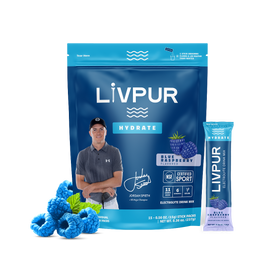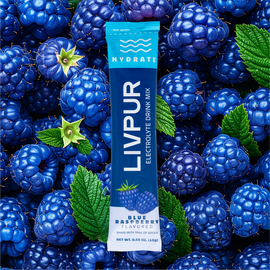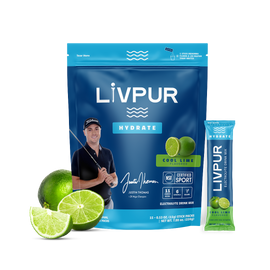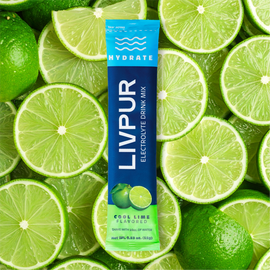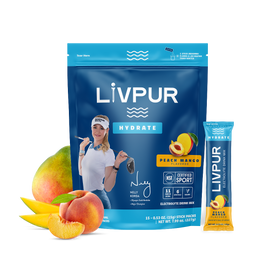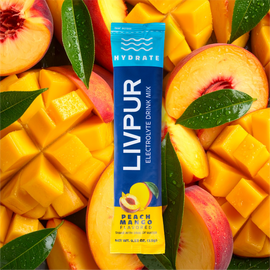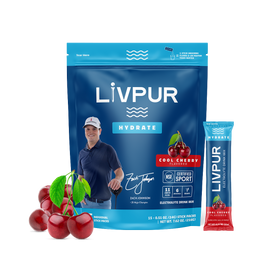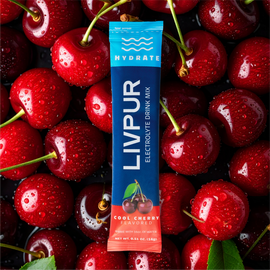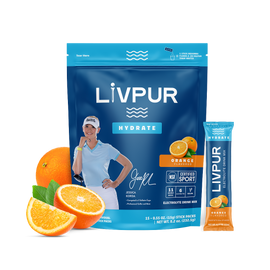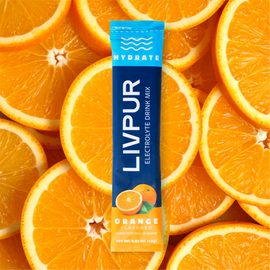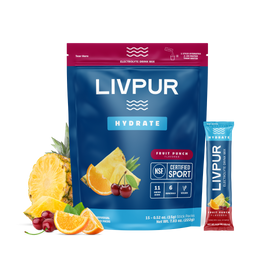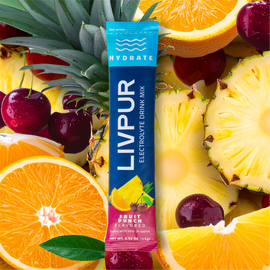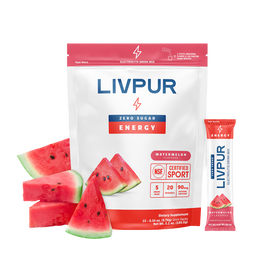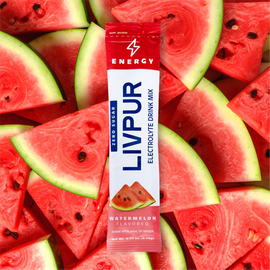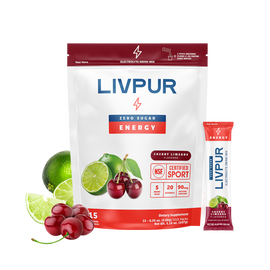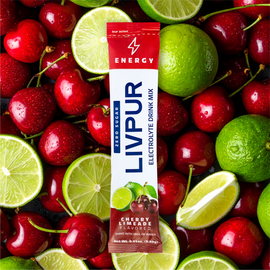November 01, 2023 • By Laura Onie • Blog
The Science Behind Electrolyte Powders: Are They Worth It?
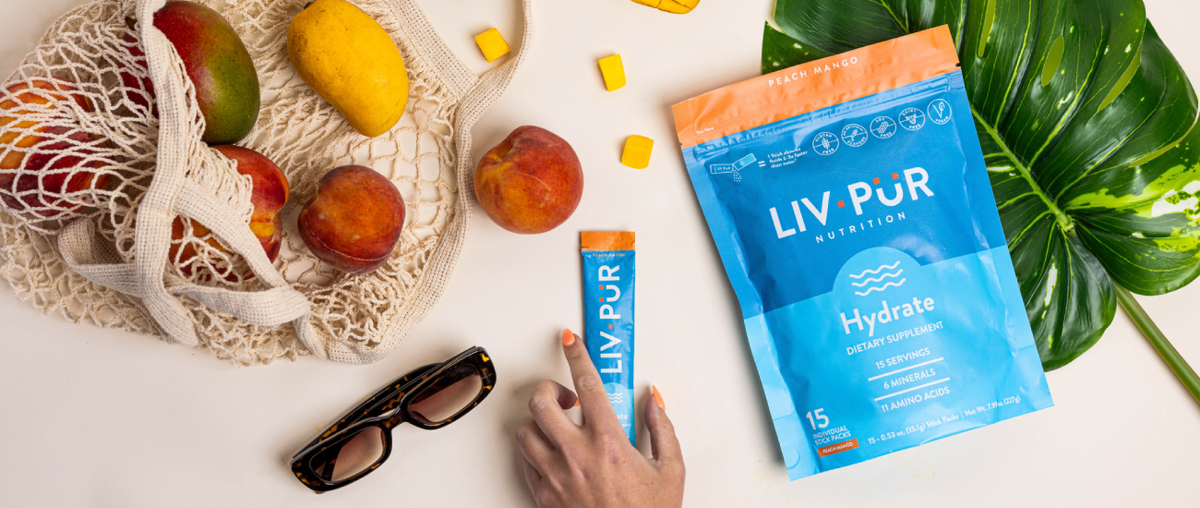
You may have heard that 75% of adults are chronically dehydrated. These estimates are largely based on self-reported surveys and lack hard evidence. Still, there’s reason to believe many of us are mildly dehydrated daily, putting renewed focus on hydration.
We’re leading busier lifestyles, and our diets contain too much sodium, just to name a few. Plus, we’d still like to stay active and hit our fitness goals. Add in a few evening cocktails, and we’re not replenishing fluids as adequately as we should.
The modern solution is hydration powder. Small sachets of electrolytes and nutrients mix with water to create a flavored drink that promises optimal fluid balance and all the good stuff that goes with it.
But do you really need them? Hang on as we take a deep dive into electrolyte powders. We’ll cover what electrolytes are, how exactly they help hydration, and what to look for in a hydration supplement.
How do hydration powders work?
Effective hydration powders contain electrolytes like sodium as well as glucose (sugar). Mix the powder in water and drink it, and it helps deliver the water to cells faster than if you just drank water. This is called the sodium-glucose transport system.
Specifically, it’s the glucose that helps sodium (and its other electrolyte friends) traverse the intestinal wall and enter the bloodstream.
If you prefer a low-sugar hydration powder, this is not an issue. It takes little glucose to make the magic happen. It’s certainly more effective than no sugar at all when you’re looking for rapid rehydration.
All About Electrolytes
The essential nutrients electrolyte powders contain bring many benefits, but electrolytes will always be the headliner.
What is an electrolyte?
Electrolytes are minerals that become electrically charged when they dissolve in water. They not only help water pass through your cells, but they know how to send it to places that need it the most.
They can do this with nutrients as well, so hydration powders with these add-ons may be a more efficient way to get extra vitamins, which we’ll discuss in a bit.
Here are some minerals you recognize, but probably didn’t know were so essential to hydration. Other important electrolytes include calcium, chloride, zinc, and phosphorus.
Sodium
If a high sodium diet is dehydrating, how is it that sodium is the king of electrolytes? It all comes down to water. Remember, these are minerals that become charged when they dissolve in fluids.
When you eat a lot of sodium but aren’t drinking water, your body starts pulling water from cells. If you drink a lot of water and don’t consume sodium, your blood becomes too diluted, and electrolyte balance is thrown off.
But if you have an electrolyte drink, sodium is critical to delivering that fluid to the cells.
There’s a good lesson here – if you’re eating something salty, always increase your fluid intake. If you want optimal pH balance, nerve function, and so much more, focus on the sodium present in hydration drinks. Consume sodium in moderation elsewhere.
Potassium
Like sodium, potassium has important interactions with your intracellular fluid (fluid inside your cells) and your extracellular fluid (fluid in the blood, spine, etc.). Specifically, sodium moderates extracellular fluid amounts while potassium takes charge of the intracellular.
Therefore, these two should always be bundled together in an electrolyte powder. Potassium is every bit as important as sodium when it comes to nerve function and overall biological balance.
Interestingly, if your sodium consumption is such that you deal with hypertension, extra potassium can lighten the load. It’ll step in and decrease those high amounts of extracellular fluid, alleviating water retention. This mechanism doesn’t apply to hydration drinks, but it is a clear example of how the two work synergistically.
Magnesium
Magnesium is rather underrated as an electrolyte, at least where it concerns research. What is well-known is magnesium’s assistance in balancing out other electrolytes, especially sodium, potassium, and calcium.
This mineral is also known to augment the benefits of good hydration in relieving muscle cramping and tension. It’s also important for nerve function, heart health, healthy blood pressure, and stable blood glucose.
What else is in the best electrolyte powder?
As mentioned, electrolytes surfing the sodium-glucose transport highway let other nutrients in, too. That’s why brands take the opportunity to add some other good stuff that can maximize your results.
Vitamins
Water-soluble vitamins like vitamins C, B6, and B12 need to be replenished daily. Of course, not everyone’s diet will include 100% of what you need every single day, so hydration drinks can really help here.
They also contribute to some of the benefits we’ll discuss in a minute, like energy and immune support.
Amino Acids
Amino acids are well-known to support lean muscle growth. They’re also good for maintaining muscle mass if you’re hitting the cardio extra hard.
Of the 20 amino acids we need, nine of them cannot be made by our own bodies; we get them in foods or supplements. However, it’s not just convenience that inspires their inclusion in hydration powder.
Some amino acids serve a role similar to glucose in helping transport sodium for fluid balance. You can read our blog on amino acids for hydration, but next up, we’re talking about why people stick with electrolyte powders.
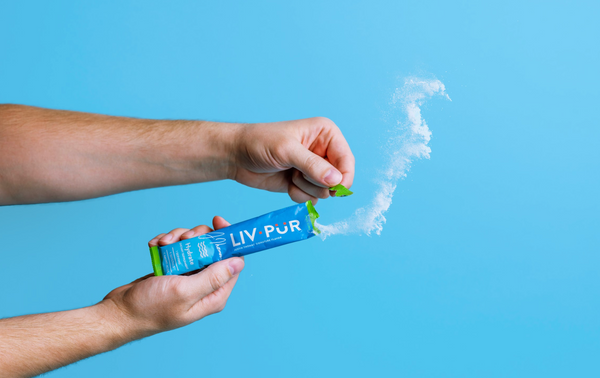
The Best Benefits of Using a Hydration Powder
Like most potential benefits we get from supplements, a lot of them are seen over time with consistent use. But staying hydrated is your job every single day. A few of these benefits might appear as soon as you restore fluid balance and get extra nutrients from a quality formulation.
Your muscles love it.
Muscle cramping, next-day aches, and even the odd spasm are common signs of even mild dehydration. It’s difficult to focus, let alone perform, when your muscles aren’t on board with it.
The minerals in electrolyte powder, especially magnesium, may help ease this symptom. Your muscles need hydration too, so that combo of minerals and water can help improve contraction for safer, stronger movement.
Hydrating after hard work is good for muscles, too. Healthy blood flow aids in repair and helps you get back on your feet the next day.
It gives you a clean, mean energy boost.
Hydration alone is energy. Some medical professionals suggest that the fatigue we experience in the afternoon is actually a mild case of dehydration best addressed with a glass of water, not a mug of coffee.
An electrolyte powder with glucose and amino acids can work faster, so you get quicker results when exhaustion rears its head. If you’re exercising, a modest amount of carbohydrates (think cluster dextrin) in a hydration solution can take it even further.
It supports the immune system.
The vitamin C in many electrolyte powder packets might be all the immune support you think you need. While it can’t hurt, the hydration itself might be even more protective.
When you’re properly hydrated, your blood has an easier time carrying and delivering nutrients. Plus, the body’s natural detoxification processes require hydration to keep things flushed out.
They may keep you on top of your game.
And we’re not just talking about how those muscles perform. Everything from your mood to your ability to focus depends on fluid balance.
A lack of minerals such as sodium and magnesium is linked to lethargy, irritation, stress response, and more. Since we sweat out these minerals along with water, replacing them ASAP is even more important during strenuous activity.
You might even sleep better.
The same minerals we count on for their electrically charged properties bear a link to quality sleep. Having a hydration drink won’t make you sleepy, but it can encourage balance, including in the nervous system.
Do I need electrolyte powder?
If you don’t sweat much and have no trouble getting enough fluids every day, you likely don’t need an electrolyte powder. Still, it’s good to keep them on hand. Illnesses where
you become dehydrated, nights where you drink a little too much alcohol, along with those days when you do break a sweat, demand more.
If you perform any type of high-intensity exercise or activity where you break a sweat frequently, along with trouble meeting daily fluid intake, consider adding electrolyte powder to your water.
Finding the Right Supplement for You: Key Considerations
As always, you have to read the fine print. Never buy online or in-store before inspecting the label. Here are a few things to be on the lookout for.
Quality assurances and certifications.
The Food and Drug Administration (FDA) does not regulate dietary supplements. To help ensure safety, they created good manufacturing practices (GMP). Supplements manufactured in GMP facilities are held to certain quality standards.
Additional certifications, such as NSF Certified for Sport®, demonstrate to the consumer that a product has been audited numerous times.
The Certified for Sport® certification is the “only independent third-party certification program recognized by the United States Anti-Doping Agency (USADA), Major League Baseball, the National Hockey League, and the Canadian Football League…[it’s] recommended by the NFL, NBA, PGA, LPGA, CCES, CPSDA, iNADO, Ironman, NASCAR, Taylor Hooton Foundation, and many other organizations seeking to mitigate the risks of contaminated dietary supplements.”
Manufacturers, regulators, and consumers also count on the NSF in facilitating the development of public health standards. Ultimately, these certifications help protect food, water, consumer products, and the environment.
Natural flavors.
It’s true that words like “natural” are surrounded by misconceptions and sometimes, a little fearmongering. However, it is worth reducing the number of artificially flavored products in your diet.
Why? Artificial flavors are addictive and add no nutritional value to your diet. They may have a negative impact on digestion since your gut flora are never going to thrive on lab-synthesized ingredients.
Finally, some have been associated with inflammation – a condition we’re actively working against when we take most supplements.
Ingredient dosages.
Maybe there’s one ingredient on the label that caught your eye. If half of the appeal of a formula is one particular nutrient, analyze the dose.
The benefits associated with an ingredient typically come down to how much the supplement contains and how consistently you take it.
For example, LivPur Hydrate contains 100% of the recommended daily value of B12, but 20% of your daily zinc.
That’s enough zinc to suit the intended purpose (electrolyte balance), but other benefits of zinc may be associated with a higher daily dose. As for B12, if you Hydrate regularly, you won’t need to worry about supplementing more of it for max benefit.
Any warnings/intake limits.
How many times a day can you use a hydration powder? Is it okay to use if you’re breastfeeding? Under 18? You may not expect it of a simple electrolyte solution, but all of these considerations matter, so read up before you buy.
Furthermore, if you’re on any medications or have a diagnosed medical condition, you need to double-check with your doctor first.
The Bottom Line on Hydration Powder
Hydration powder isn’t just hype; it uses electrolytes to deliver the benefits of water faster. Plus, electrolyte balance is essential to nearly every bodily process there is.
Using these mixes may help you sustain energy levels, support natural detox, avoid aches, and more. They’re typically suitable for daily use, or just on those occasions where you really need additional hydration.
Add in some other supporting nutrients, and you have a no-nonsense solution to the demands of daily life.
Just be sure to avoid mixes with tons of added sugars and artificial ingredients. This is why modern electrolyte powders are fast replacing sports drinks. A little glucose to help transport the electrolytes with some natural flavor is all you need.
Interested in learning more? Check out the complete breakdown of LivPur’s Hydrate solution. With natural flavors, five electrolyte minerals, 11 amino acids, and a handful of essential vitamins, it checks every box.
